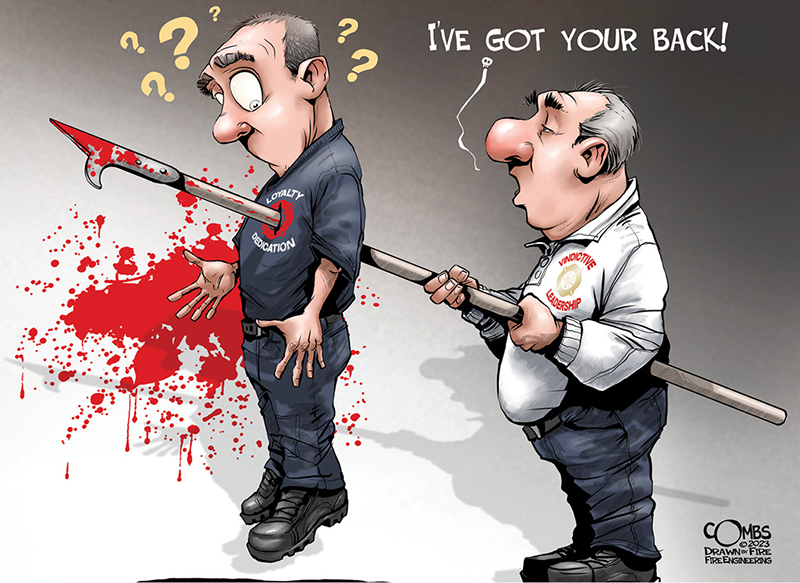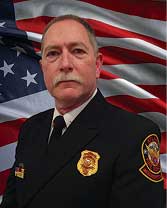
Editor’s Opinion | By David Rhodes

Seven years ago this month, I was called into the fire chief’s office and told that my services were no longer needed. Yes, terminated was the exact term. No reason was given. I would learn several weeks later that it was because of an article I wrote titled, “T-Shirt Management.” The article had been around for a couple of years before it resurfaced on a Web site and the person who fired me happened to see it. No, I hadn’t violated any policies. No, I didn’t identify myself as an employee of any organization. No, I wasn’t even speaking about my own organization but rather the fire service as a whole. I had been writing articles for nearly two decades at that point.
I was allowed to clean out my locker with a security detail watching over my shoulder and then escorted to my vehicle. A small circle of on-duty members stood in disbelief. I was in shock and so were they. After a few teary-eyed good-bye hugs, I told them, “Always do the right thing!” as I got in my vehicle and drove away.
The next call was to my wife, and that was the most difficult of all. So many questions: What now? How will we pay our bills? What about our kids, our house, our cars…? Then I placed a call to the union president and ultimately our attorney. Over the next few weeks, attorneys were talking, and I was told that something was being worked out.
I am a firm believer in personal responsibility, and I searched and searched for some legitimate reason for what was going on. What exactly had I done that was so egregious to warrant tossing me out after 30-plus years of service with no disciplinary history? Basically, the person with the authority didn’t like the article. Luckily, the attorneys were a little more rational. I never missed a paycheck despite being off for almost 45 days. There was this little clause in the U.S. Constitution called the First Amendment that afforded me a very big blanket of protection since I had followed all the rules.
It took a lot of sausage making to get things sorted out on both ends, but finally settlements were reached, and I returned to work and ultimately back to my previous position. I would like to think that I came back and never missed a beat, but the fact is, I always felt betrayed. I think I did a good job in the roles that I served in after that day, but I was different inside. The feeling of betrayal can best be visualized in the 1995 epic movie “Braveheart” when Mel Gibson’s character, William Wallace, is fighting for Scottish freedom against the English. He is fighting an opposing English knight. He gains the edge and pulls the armor mask off his opponent only to find he wasn’t fighting an English knight but the Scottish king that Wallace himself was out there risking his life for. He had been massively betrayed. The look on his face says it all: institutional betrayal!
Going into survival mode is quite an interesting journey. On one hand, you move more cautiously at work, volunteer for fewer things, and limit your exposure—all while trying to keep your spirits up and quietly doing things within your own area of responsibility to make things better or at least not worse. Off duty, I did more teaching, writing, and developing programs for other people and other organizations. My desire to serve didn’t go away but the serving, creativity, and risk taking occurred outside my organization. Luckily for me, I had numerous other groups and outlets including Georgia Smoke Divers, FDIC International, the UL Fire Safety Research Institute, my own consulting and training team, along with a very stable and strong family life. I was able to make it through the storm and come out better on the other side. Traumatic growth is truly the best way to describe it.
Not everyone has inherent resiliency and strong communities of support. I often think about how many people experienced vindictive management and had their worlds turned upside down over something as petty as a disagreement or difference of opinion. There is not a lot of information out there on the effects of poor leadership on our firefighters’ mental health. Many leaders are very quick to bang the drum for post traumatic stress disorder and things that we can trace back to or blame on an incident that was beyond our control. Not to take away from the trauma that many incidents may cause, but what about the chronic exposure to day-to-day bad leadership? What about the intentional exclusion, discrimination, or just plain old bad boss behaviors of choosing who is going to win and who is going to lose?
The fire department is one of our support communities. The men and women who serve these communities also serve each other as friends, supporters, resources, and co-workers. If that part of the community is fractured, it causes a certain level of mental trauma. If, in fact, you do happen to respond to an incident that is mentally traumatic and the resiliency of your own fire department community isn’t there for you, then it’s no wonder mental health is such a crisis in our organizations.
I am certainly not saying that we should eliminate warranted disciplinary action and, in some cases, terminations. What I am asking is that before you take any action as a leader, supervisor, or chief, take a deep breath and think about the situation before you act. There is a BIG difference between discipline and intentional personal destruction. When life-altering, career-ending decisions are made by a supervisor out of emotion and not justifiable cause, the employee usually wins back the job, back pay, position, and attorney’s fees, but the organization rarely wins back the same employee.


